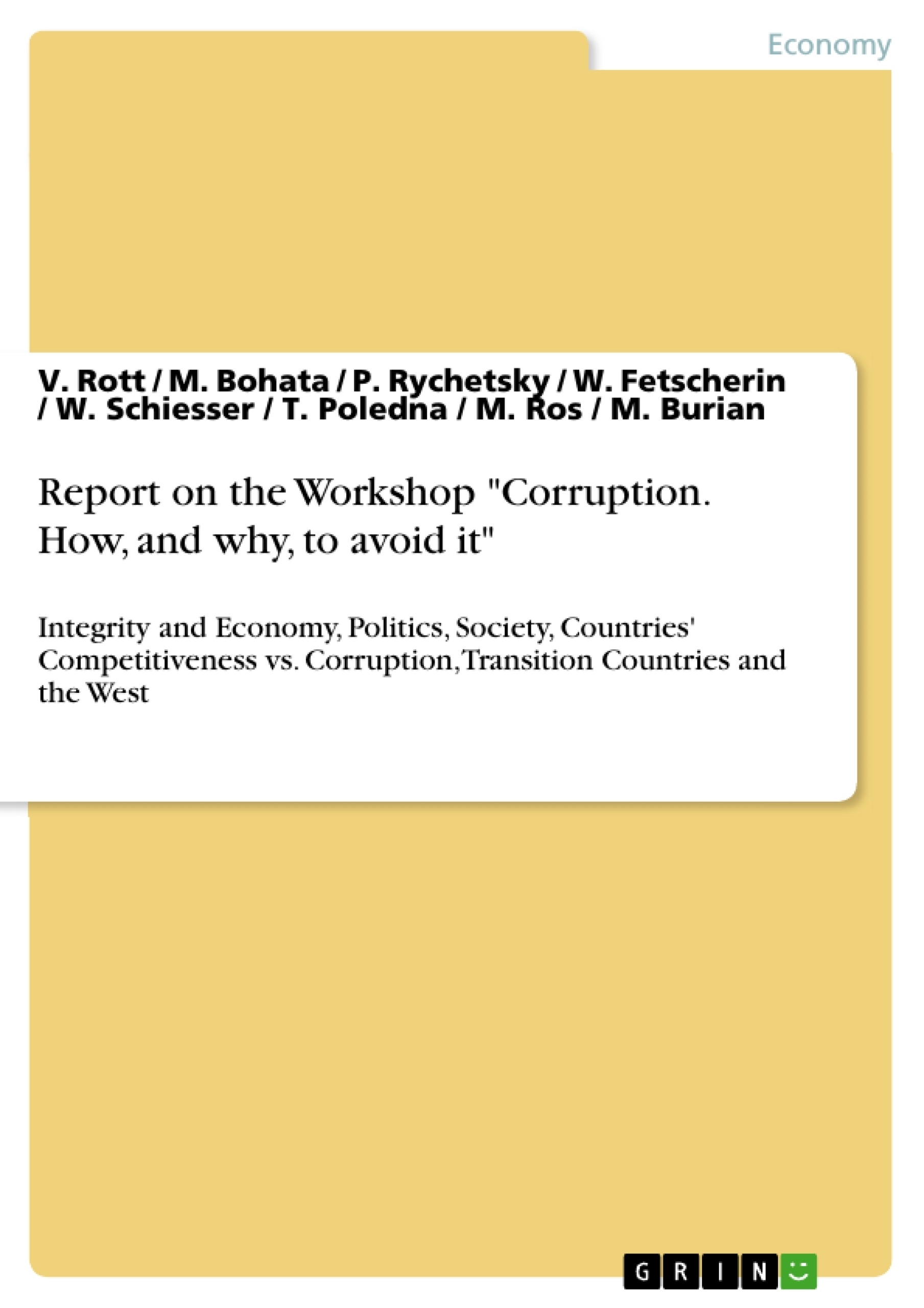This work is a summary of workshop speeches and discussions of the multidisciplinary workshop "Corruption – How, and why, to avoid it" took place at the CERGE-EI, Centre for Economic Research and Graduate Education in Prague, 11 November 1998.
The workshop was hosted and arranged by various groups from the NGO, academic and private sector, or in cooperation with them.
Some material on the international framework and on the media role is listed in the report and included in appendices of the printed edition.
Inhaltsverzeichnis (Table of Contents)
- The Workshop
- Summary Overview of Speakers' Comments
- Comments of HE Pavel Rychetsky
- Comments of HE Walter Fetscherin
- Summary Overview of Discussions
- Conclusions
- Acknowledgements
- Annex (with Table of Contents)
Zielsetzung und Themenschwerpunkte (Objectives and Key Themes)
This report presents a summary of a workshop entitled "Corruption - How, and Why, to Avoid It", held in Prague in November 1998. The workshop focused on examining corruption as a societal ill and its implications for economic and political development in the Czech Republic. It aimed to explore ways to address corruption through legal, administrative, and social measures.
- The impact of corruption on economic competition and fair business practices
- The role of the government in combating corruption and establishing a level playing field for businesses
- The importance of international cooperation in addressing corruption
- The need to raise awareness of the detrimental effects of corruption on society
- The role of the private sector in combating corruption
Zusammenfassung der Kapitel (Chapter Summaries)
The workshop's opening addresses, delivered by JUDr. Pavel Rychetsky and HE Dr. Walter Fetscherin, highlighted the government's concern with corruption and its detrimental effects on businesses and citizens. They discussed measures to minimize corruption, including non-cash payments and property reporting systems. The importance of international cooperation in combating corruption was also emphasized, with specific reference to international conventions like the OECD's convention against bribery of public officials.
The report then provides a summary overview of the speakers' comments, focusing on the detrimental effects of corruption on societies and the need for programmes to counter its growth. It also examines Switzerland's approach to combatting corruption, highlighting the incorporation of strict punishments into national legislation.
Schlüsselwörter (Keywords)
The key focus of this report revolves around the theme of corruption, exploring its impact on economic competition, business practices, and societal development. The report examines various aspects of corruption, including legal frameworks, administrative measures, and the role of government, international cooperation, and the private sector in combating it. Additional key terms include "Clean Hands" campaign, international conventions, OECD, bribery, and non-cash payments.
Frequently Asked Questions
What was the theme of the 1998 workshop in Prague?
The workshop focused on "Corruption – How, and why, to avoid it," specifically in the context of the Czech Republic.
Who organized the workshop?
It was hosted by various groups from NGOs, the academic sector (CERGE-EI), and the private sector.
What measures to minimize corruption were discussed?
Discussed measures included non-cash payments, property reporting systems, and the "Clean Hands" campaign.
What is the role of international cooperation in fighting corruption?
The report emphasizes the importance of international conventions, such as the OECD's convention against bribery of public officials.
How does corruption affect economic development?
Corruption distorts economic competition, prevents fair business practices, and hinders overall political and social development.
- Citation du texte
- V. Rott (Auteur), Dr. M. Bohata (Auteur), Dr. P. Rychetsky (Auteur), Dr. W. Fetscherin (Auteur), W. Schiesser (Auteur), Dr. T. Poledna (Auteur), Dr. M. Ros (Auteur), M. Burian (Auteur), 1998, Report on the Workshop "Corruption. How, and why, to avoid it", Munich, GRIN Verlag, https://www.grin.com/document/141704



